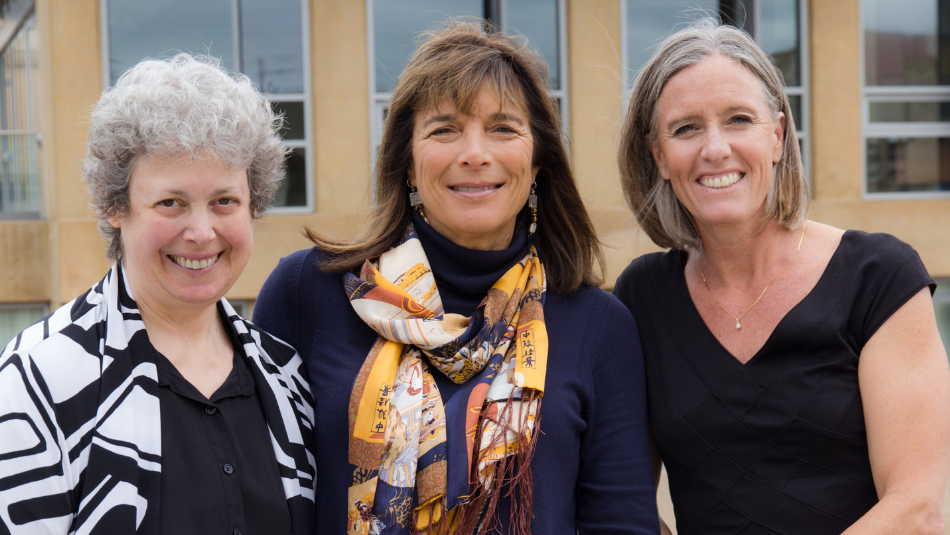
Dean Nancy Guerra, center, congratulates Deborah Lefkowitz, left, and Jodi Quas.
Professor and Newly Minted Ph.D. Selected for Dean’s Award for Inclusionary Excellence
By Mimi Ko Cruz
Jodi Quas and Deborah Lefkowitz have been named the 2019 Dean’s Award for Inclusionary Excellence for their research to improve lives in underrepresented communities.
The honor — bestowed by Nancy Guerra, dean of the School of Social Ecology — annually recognizes a faculty member and a graduate student whose research showcases diversity and inclusion, and comes with a $1,000 award for each recipient.
Jodi Quas
Quas, professor of psychological science, studies the effects of maltreatment and exploitation of children, most often those who live as wards of the state because of experiences of abuse within their family. She also researches the effects of legal involvement on children and families, both when children have been abused and when children are suspected of committing crimes. Her work shows how these children should be questioned to find out what has happened to them, and how best to help children and parents understand and cope with a legal case as it is unfolding.
In her recent paper that appeared in the American Psychological Association’s journal, Psychology, Public Policy, and Law, Quas and her former doctoral student, Kyndra Cleveland, now a postdoctoral researcher at Vanderbilt University, investigated how much parents whose children had been removed from their custody and were now wards of the state actually understood about the juvenile dependency system in which they and their children were now involved.
“Until this research, virtually no scientific attention had been directed toward parents’ experiences when they become immersed in the dependency system, a system that is widely considered much more complicated in policies, statutes, and state and federal mandates than the criminal system,” Elizabeth Cauffman, professor of psychological science, noted in her award nomination letter for Quas. “How much parents understand about the system and their case has direct implications for their compliance with court orders and, hence, the likelihood of them reunifying with their children.”
Stated another way, in order for parents to move toward reunification, they need to understand what the court is requiring them to do, by when, and with whom they need to interact to meet those requirements, Quas explains. Any lack of understanding on the part of parents affects their behavior and hence their chances for reunification.
“I am committed to pursuing research that has an impact on some of the most vulnerable populations in society — families who are immersed in the justice system as a result of maltreatment,” Quas says. “These families are often overlooked once they become involved in the legal system, but their experiences both before and during a case have long-lasting effects not only on all members of the family, but on communities and society as well. My work aims to find ways of altering families’ experiences to improve outcomes for all those affected.”
Deborah Lefkowitz
Lefkowitz graduated this month with her Ph.D. in social ecology. Her dissertation, “Mapping Breast Cancer Survivorship and the Survivor Institutional Interface,” examines health equity for medically underserved breast cancer patients and survivors. Funded by the National Cancer Institute of the National Institutes of Health (Award F31CA192478), the dissertation documents pathways and barriers to access, the potential for disparities to emerge through processes of determining eligibility for services, and financial distress as a long-term barrier to recovery after breast cancer treatment.
The award committee was impressed with the efforts Lefkowitz made to include a diverse group of breast cancer survivors as research participants: nearly 50 percent of the 82 survivors interviewed were non-white; 12 percent were monolingual Spanish speakers; many were low income with low levels of education, some were undocumented and several had disabilities that affected their physical as well as mental health. Lefkowitz did extensive outreach within the Inland Empire to recruit survivors from 27 cities, including rural and remote desert communities, and to draw from survivor populations that had previously been significantly underrepresented in cancer and survivorship research.
Lefkowitz says she is fortunate to be “richly connected within a nexus of scholars, community activists, healthcare professionals, and cancer survivors.” Her research has been inspired by her long-term involvement with organizations that provide services to cancer patients and survivors. Now, she is collaborating with the Cancer Legal Resource Center (CLRC), a program of the Los Angeles-based Disability Rights Legal Center, on a new research project to improve services and information for vulnerable cancer patients in California’s medically underserved regions. She and CLRC’s director were selected for a unique training opportunity through the University of California’s California Breast Cancer Research Program that supports community-academic research partnerships focused on breast cancer causes and disparities.
Lefkowitz says she is grateful to have studied social ecology at UCI because “it’s directed toward problem-solving in the real world and provides an extremely useful framework for studying healthcare service delivery.”
She benefited from the flexibility and interdisciplinary scope of the Ph.D. core program in social ecology to create an individualized course of study and assemble a five-member dissertation committee from across several disciplines and schools. Led by Martha Feldman, Johnson Chair for civic governance and public management and professor of urban planning and public policy, her dissertation committee included Daniel Stokols, Chancellor’s Professor Emeritus and founding dean of the School of Social Ecology; John Whiteley, professor of social ecology; Lari Wenzel, professor of medicine and public health and associate dean for faculty development at the School of Medicine; and Kaaryn Gustafson, professor of law.
After attending Lefkowitz’s Ph.D. defense in April, Kirk Williams, director of the Ph.D. core program in social ecology, wrote that her dissertation “showcased the quality of the students in social ecology and the quality of their research,” and he commended Lefkowitz for being “a shining exemplar of our program.”